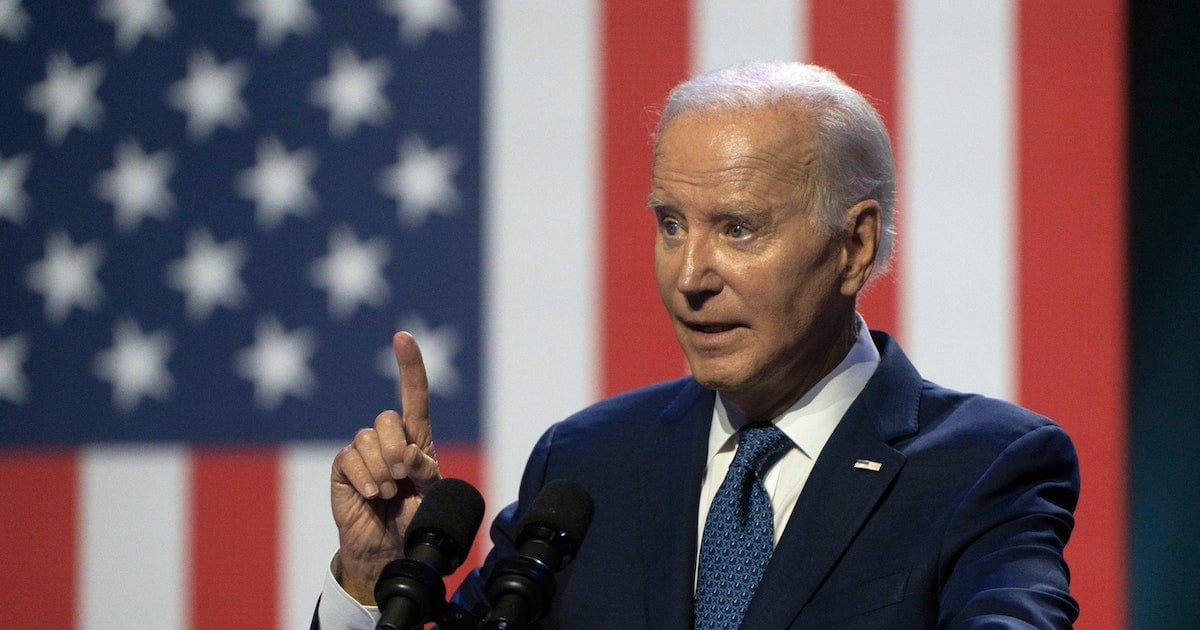
President Biden will give what they’re billing as the first speech of his reelection campaign today, and in it, he will attack Donald Trump by name as a historic threat to democracy. An aide told The Washington Post that Biden “is going to be very straightforward on what happened, the truth of what happened, and the role that Trump played in that.”
The speech will arrive, as we approach the third anniversary of the insurrection, in about as bleak a context as we could imagine. Trump leads Biden in most head-to-head polls, albeit just by a point or two. And Republicans are apparently rallying to Trump. A Post poll released earlier this week had some gob-smacking findings showing that Republicans are far less concerned about January 6 than they were right after it happened, and they weren’t very bothered then.
We’re in a surreal hall of mirrors. Trump keeps suffering legal defeat after legal defeat. He’s being tossed off state ballots. His lawyer all but admits he led an insurrection. A new House report details nearly $8 million he made from foreign governments while serving as president. And for now, none of it matters.
This campaign will be about a lot of things, as all campaigns are. But the main question will come down to this and this alone: Will a majority or plurality of Americans use their vote—that is, employ the peaceful means of democracy’s most essential right—to put a violent fascist back in charge of this country?
That the answer isn’t a clear “no” is terrifying. But here’s the thing. Some would argue that the fact that the answer isn’t a clear “no” means that Biden and Democrats shouldn’t emphasize the issue because it’s not a clear winner. I say the opposite is the case. Emphasize the issue and make it a winner. If polls today show that not enough people care about democracy, don’t just follow the polls. Change the polls. Make them care.
Republicans understand this dynamic and have for years. The classic recent example is the Iraq war. After the 9/11 attacks, no one outside a handful of neoconservatives thought they justified waging war on Iraq. But over the course of 2002, the Bush White House changed public opinion. They did it largely through lies, but they did it. By the time the United States invaded Iraq, majorities supported it.
Trump has changed polls, too. Pre-Trump Republicans believed a lot of bad things, and I’m certainly not sugar-coating that GOP—which, after all, laid down and gave itself over to Trump. But they did still believe in the general integrity of the American electoral system. No one was urging Mitt Romney to dispute the 2012 election results. Romney conceded on election night (or very early Wednesday morning, technically), and everyone moved on. But by 2016, Trump was saying that he would respect the results “if I win.” And that was all it took. The polls, at least among Republicans, changed and changed dramatically.
Democrats historically don’t do this. When the polls are on their side—as when, for example, George W. Bush tried to privatize Social Security in 2005—they’re as swashbuckling as Blackbeard. (That was one case where the GOP/right-wing media onslaught failed conspicuously to change the polls.) But when the polls aren’t on their side, they’re about as swashbuckling as Caspar Milquetoast.
If they want to make this democracy argument—and I think they’re right to do so—and if they want to win it—and they must—this habit has to change. They need to be mapping out a plan now that stage by stage will lay out an argument to voters (swing voters especially) that by Election Day will have them terrified at the prospect of Trump getting back into the White House. This can, and must, start with January 6. But then, by late spring say, and especially by the fall, the argument should be almost entirely about the future. Attack ad after attack ad simply need to take Trump’s own words, and the words of his people in leaks to media outlets, about how they’re going to impose authoritarianism in his second term. I would anticipate, too, that by the fall Trump will have said as much many times on the hustings, handing the Democrats fresh and irrefutable fodder.
Obviously there are other things the Democrats need to do. They are positioned to win millions of votes on the question of abortion rights. They have to press an economic argument the best they can, and as I wrote Monday, if some economic predictions are right, that could be less of a challenge than it seems like it will be today.
But there is a deep moral and ethical question at the center of this election unlike any other of my lifetime. Will Americans use the tools of democracy to hand their country to a democracy destroyer? They won’t if Democrats refuse to accept the “people don’t care about democracy” argument and make them care.